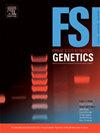Interlaboratory exercise to establish proficiency testing for sequencing of forensic STR and SNP markers
IF 3.1
2区 医学
Q2 GENETICS & HEREDITY
引用次数: 0
Abstract
Massively parallel sequencing (MPS) is increasingly used in forensic DNA analysis for SNP and STR genotyping, though accredited proficiency tests remain limited. To address this, five forensic DNA laboratories from four countries participated in a study to assess MPS methods across different kits and platforms. In this study ForenSeq DNA Signature Prep Kit, ForenSeq MainstAY kit, Precision ID GlobalFiler NGS STR Panel v2, Precision ID Identity Panel and Precision ID Ancestry Panel were used to analyze four reference samples and three mock stain samples with different number and proportion of contributors (3:1, 3:1:1, 6:3:1). Performance for autosomal, Y-chromosomal, and X-chromosomal STRs, as well as for identity-, ancestry-, and phenotype-informative SNPs was evaluated. In addition, appearance and ancestry prediction for unknown sample donors was compared between the laboratories. Overall, the results from the participating laboratories showed a high level of agreement, regardless of the platform employed. The issues leading to unsuccessful genotyping were mainly related to different characteristics of the library preparation kits and sequencing technologies, software algorithms used for genotyping (e.g. noise and artefact filtering), or in-house interpretation rules (such as thresholds for allele calling or imbalance). The findings also emphasized the importance of using multiple software tools for accurate ancestry and phenotype prediction. The outcome of the study will help to standardize MPS practices, ensuring reliable and consistent results across laboratories. These findings contribute with valuable knowledge for developing future proficiency tests in forensic MPS analysis, offering insights into analytical variability and result reliability. This study identified key issues affecting genotyping accuracy, critical for developing effective proficiency tests. The insights gained apply broadly to current and future MPS kits.
实验室间练习建立法医STR和SNP标记测序的熟练测试
大规模平行测序(MPS)越来越多地用于法医DNA分析,用于SNP和STR基因分型,尽管认可的熟练程度测试仍然有限。为了解决这个问题,来自四个国家的五个法医DNA实验室参与了一项研究,以评估不同试剂盒和平台上的MPS方法。本研究使用ForenSeq DNA Signature Prep Kit、ForenSeq主干试剂盒、Precision ID GlobalFiler NGS STR Panel v2、Precision ID Identity Panel和Precision ID Ancestry Panel分析了4个参考样本和3个模拟染色样本,它们的贡献因子数量和比例分别为3:1、3:1:1和6:3:1。评估了常染色体、y染色体和x染色体STRs以及身份、祖先和表型信息snp的性能。此外,在实验室之间比较了未知样本供体的外观和血统预测。总体而言,无论采用何种平台,参与实验室的结果都显示出高度一致。导致基因分型失败的问题主要与文库制备试剂盒和测序技术的不同特征、用于基因分型的软件算法(如噪声和人工滤波)或内部解释规则(如等位基因调用或不平衡的阈值)有关。研究结果还强调了使用多种软件工具来准确预测祖先和表型的重要性。该研究的结果将有助于使MPS实践标准化,确保各实验室得出可靠和一致的结果。这些发现有助于开发未来法医MPS分析能力测试的宝贵知识,为分析变异性和结果可靠性提供见解。本研究确定了影响基因分型准确性的关键问题,这对于开发有效的能力测试至关重要。获得的见解广泛适用于当前和未来的MPS套件。
本文章由计算机程序翻译,如有差异,请以英文原文为准。
求助全文
约1分钟内获得全文
求助全文
来源期刊
CiteScore
7.50
自引率
32.30%
发文量
132
审稿时长
11.3 weeks
期刊介绍:
Forensic Science International: Genetics is the premier journal in the field of Forensic Genetics. This branch of Forensic Science can be defined as the application of genetics to human and non-human material (in the sense of a science with the purpose of studying inherited characteristics for the analysis of inter- and intra-specific variations in populations) for the resolution of legal conflicts.
The scope of the journal includes:
Forensic applications of human polymorphism.
Testing of paternity and other family relationships, immigration cases, typing of biological stains and tissues from criminal casework, identification of human remains by DNA testing methodologies.
Description of human polymorphisms of forensic interest, with special interest in DNA polymorphisms.
Autosomal DNA polymorphisms, mini- and microsatellites (or short tandem repeats, STRs), single nucleotide polymorphisms (SNPs), X and Y chromosome polymorphisms, mtDNA polymorphisms, and any other type of DNA variation with potential forensic applications.
Non-human DNA polymorphisms for crime scene investigation.
Population genetics of human polymorphisms of forensic interest.
Population data, especially from DNA polymorphisms of interest for the solution of forensic problems.
DNA typing methodologies and strategies.
Biostatistical methods in forensic genetics.
Evaluation of DNA evidence in forensic problems (such as paternity or immigration cases, criminal casework, identification), classical and new statistical approaches.
Standards in forensic genetics.
Recommendations of regulatory bodies concerning methods, markers, interpretation or strategies or proposals for procedural or technical standards.
Quality control.
Quality control and quality assurance strategies, proficiency testing for DNA typing methodologies.
Criminal DNA databases.
Technical, legal and statistical issues.
General ethical and legal issues related to forensic genetics.

 求助内容:
求助内容: 应助结果提醒方式:
应助结果提醒方式:


